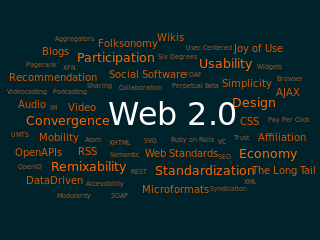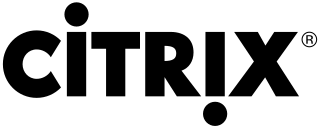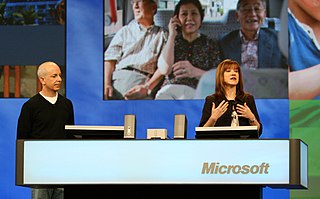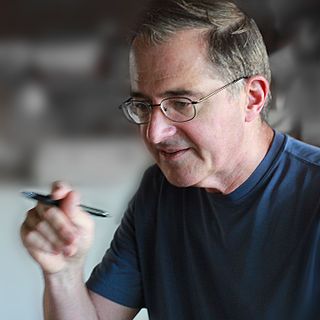Desktop publishing (DTP) is the creation of documents using page layout software on a personal ("desktop") computer. It was first used almost exclusively for print publications, but now it also assists in the creation of various forms of online content. Desktop publishing software can generate layouts and produce typographic-quality text and images comparable to traditional typography and printing. Desktop publishing is also the main reference for digital typography. This technology allows individuals, businesses, and other organizations to self-publish a wide variety of content, from menus to magazines to books, without the expense of commercial printing.

Aldus Corporation was an American software company best known for its pioneering desktop publishing (DTP) software. PageMaker, the company's most well-known product, ushered in the modern era of desktop computers such as the Macintosh seeing widespread use in the publishing industry. Paul Brainerd, the company's co-founder, coined the term desktop publishing to describe this paradigm. The company also originated the Tag Image File Format (TIFF) file format, widely used in the digital graphics profession.
Autodesk, Inc. is an American multinational software corporation that makes software products and services for the architecture, engineering, construction, manufacturing, media, education, and entertainment industries. Autodesk is headquartered in San Francisco, California, and has offices worldwide. Its U.S. offices are located in the states of California, Oregon, Colorado, Texas, Michigan, New Hampshire and Massachusetts. Its Canada offices are located in the provinces of Ontario, Quebec, and Alberta.
The Windows Hardware Engineering Community (WinHEC) is a series of technical conferences and workshops, where Microsoft elaborates on its hardware plans for Windows devices.
Macworld/iWorld was an information technology trade show with conference tracks dedicated to Apple's Mac platform. It was held annually in the United States during January. Originally Macworld Expo and then Macworld Conference & Exposition, the gathering dates back to 1985. The conference was organized by International Data Group (IDG), co-publisher of Macworld magazine.

Stevenote is a colloquial term for keynote speeches given by Steve Jobs, former CEO of Apple, at events such as the Apple Worldwide Developers Conference, Macworld Expo, and Apple Expo. Because most Apple product releases were first shown to the public at these keynotes, "Stevenotes" caused substantial swings in Apple's stock price.

Web 2.0 refers to websites that emphasize user-generated content, ease of use, participatory culture and interoperability for end users.

Citrix Online was the name of the online services division of Citrix Systems. Citrix Online sold web-based remote access, support, and collaboration software and services. Its products are GoToAssist, GoToMeeting, GoToMyPC, GoToTraining, GoToWebinar, Podio, and OpenVoice. Citrix Online used the software as a service (SaaS) and application service provider (ASP) software business models.

Microsoft Internet Explorer 4 (IE4) is a graphical web browser that Microsoft unveiled in Spring of 1997, and released in September 1997, primarily for Microsoft Windows, but also with versions available for the classic Mac OS, Solaris, and HP-UX and marketed as "The Web the Way You Want It".

Microsoft's Professional Developers Conference (PDC) was a series of conferences for software developers; the conference was held infrequently to coincide with beta releases of the Windows operating system, and showcased topics of interest to those developing hardware and software for the new version of Windows.
John W. Seybold was a father of computer typesetting. His firm ROCAPPI, started in 1963, was a pioneer in developing computer-based typesetting systems.
Caldera OpenLinux (COL) is a defunct Linux distribution. Caldera originally introduced it in 1997 based on the German LST Power Linux distribution, and then taken over and further developed by Caldera Systems since 1998. A successor to the Caldera Network Desktop put together by Caldera since 1995, OpenLinux was an early "business-oriented distribution" and foreshadowed the direction of developments that came to most other distributions and the Linux community generally.
UBM Technology Group, formerly CMP Publications, was a business-to-business multimedia company that provided information and integrated marketing services to technology professionals worldwide. It offered marketers and advertisers services such as print, newsletters, custom web sites, and events. Its products and services include newspapers, magazines, Internet products, research, education and training, trade shows and conferences, direct marketing services and custom publishing.
FlightCheck is a stand-alone application that performs preflight quality control inspection on many common file types such as Adobe InDesign, Adobe Photoshop, Adobe Illustrator, QuarkXPress, and PDF.
Cherrypal is a California-based marketer of Chinese-manufactured consumer-oriented computers. It markets a range of models with a diversity of CPU-types, structures, features, and operating systems. Commentators have observed that Cherrypal arguably beat the heralded and much-better financed one Laptop per Child (OLPC) project to its goal of a $100 "laptop".
Denise Caruso is an American journalist and analyst specializing in the industries of digital technology and biotechnology. She was dubbed “the Walter Winchell of Silicon Valley” by WIRED magazine. She is the founder and executive director of The Hybrid Vigor Institute, a non-profit think tank created in 2000 that emphasizes cross-sector collaboration.
Folio Corporation was founded in 1987 to publish books on CD-ROMs.
Steven J DeRose is a computer scientist noted for his contributions to Computational Linguistics and to key standards related to document processing, mostly around ISO's Standard Generalized Markup Language (SGML) and W3C's Extensible Markup Language (XML).

Christian Frederick "Chris" Gulker was an American photographer, programmer, writer, and pioneer in electronic publishing.

Roger Black is an American graphic designer whose work has been influential in the design of magazines, newspapers, digital typography and the web. His contributions include designs for Rolling Stone, Esquire, The New Republic, Fast Company, Reader's Digest, Foreign Affairs, the Los Angeles Times, the Houston Chronicle and the website Bloomberg.com.







